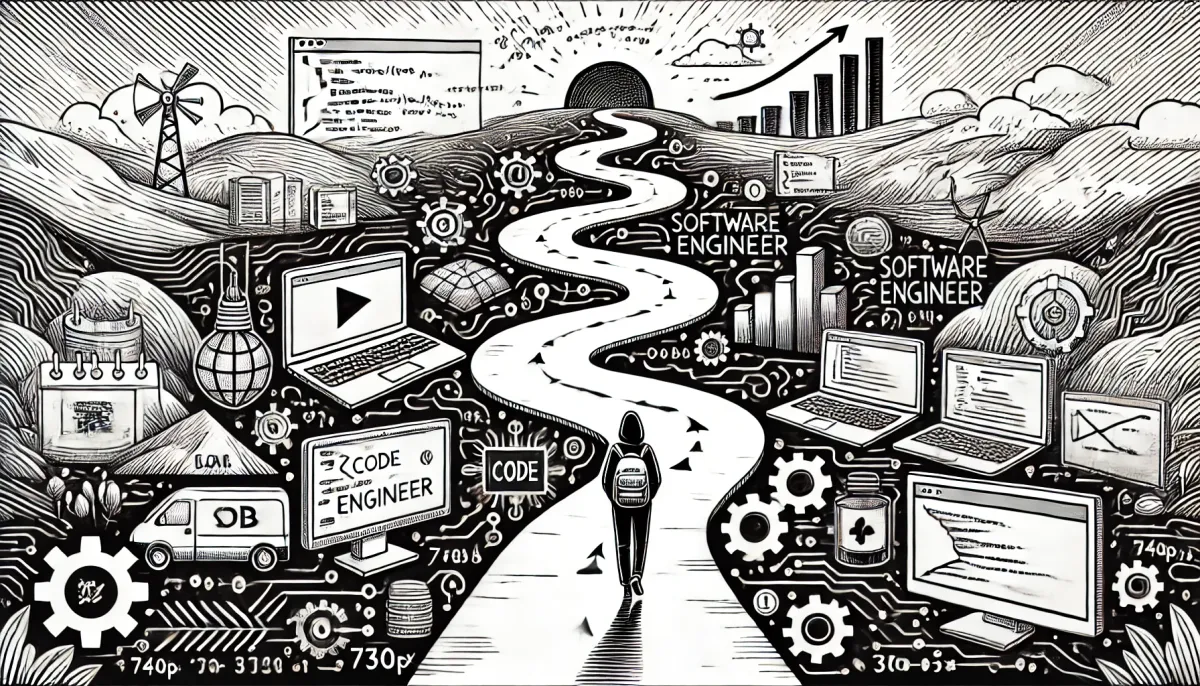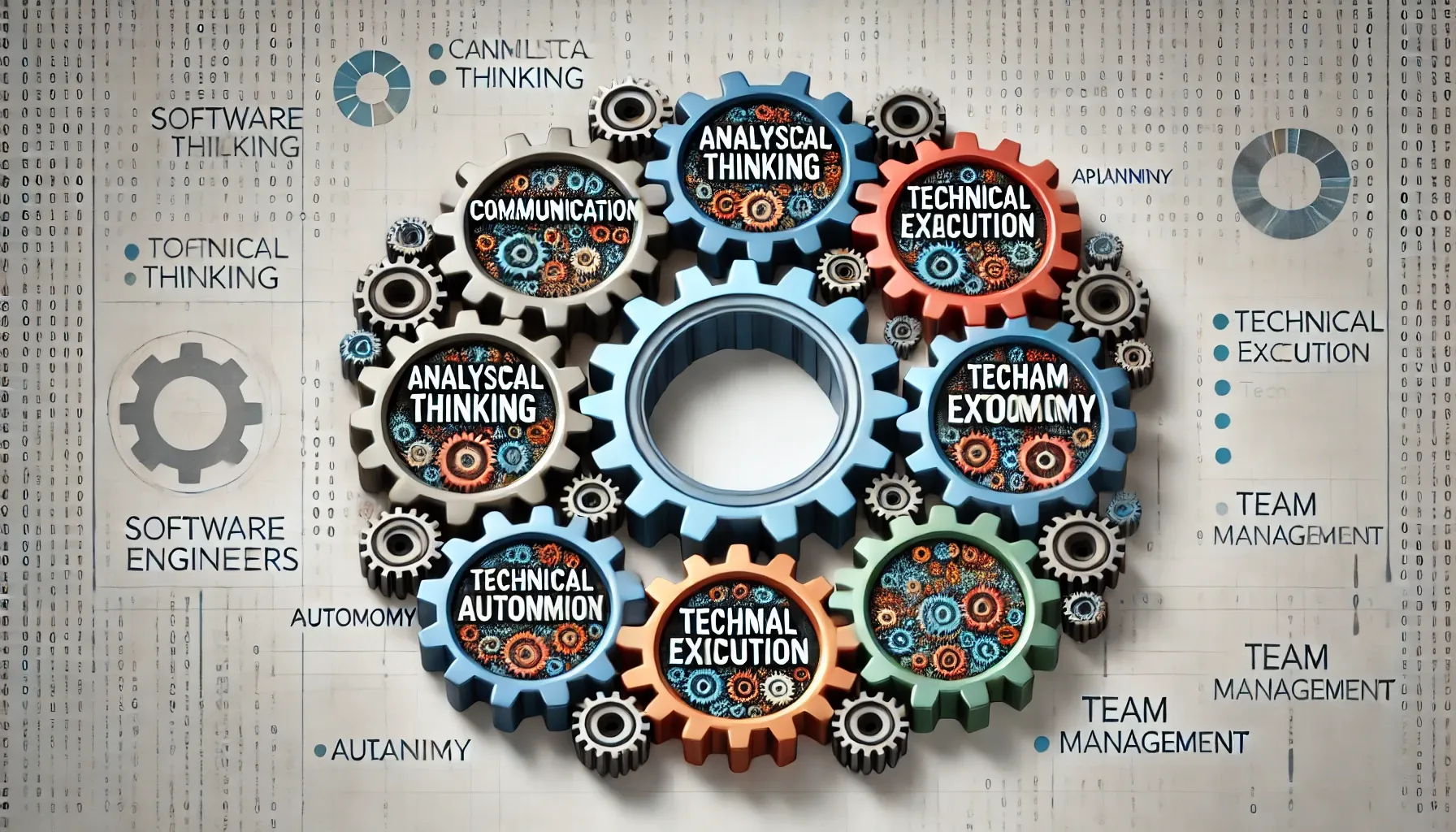The Software Engineer Career Path: Navigating Your Journey in Tech
In the rapidly evolving field of technology, understanding the trajectory of a software engineering career is crucial for personal growth and professional development.

In the rapidly evolving field of technology, understanding the trajectory of a software engineering roles is crucial for personal growth and professional development. Whether you’re just starting or contemplating your next move, knowing the skills required at each level can help you plan your path effectively.
This article provides a comprehensive overview of the software engineer’s career progression, highlighting the key skills needed at each stage and offering insights into both technical and managerial pathways. Use this guide to identify your growth areas and align your software engineering professional career with your strengths and interests.

Core Skills for Software Engineers
Software engineers should cultivate a variety of core skills throughout their careers. Consistent demonstration of these skills over time is essential for advancement. Below are the fundamental competencies every software engineer should develop:
- Communication: The ability to articulate ideas clearly, listen actively, and provide constructive feedback is vital for teamwork and collaboration.
- Analytical Thinking: Breaking down complex problems into manageable components, identifying patterns, and making informed decisions are key aspects of analytical thinking.
- Technical Execution: Proficiency in programming languages, development tools, design and develop solutions, and software architecture is necessary to design and implement effective software solutions.
- Autonomy: Taking ownership of tasks, prioritizing effectively, and working independently while keeping team members informed demonstrates autonomy.
- Planning: Good planning skills ensure that projects are completed on time and within budget, including the ability to create contingency plans for unforeseen issues.
- Team Management: For those on a managerial path, motivating team members, delegating tasks, and fostering a positive work environment are essential leadership skills.

Technical vs. Managerial Paths
As a software engineer, you have the option to pursue one of two primary career paths:
- Technical Path (Subject Expert): This path focuses on deepening your technical expertise. You’ll become a go-to person for specialized knowledge, driving technical decisions and innovation. You are a driver.
- Managerial Path (Team Leader): This route emphasizes managing teams and people. Your role involves creating an environment where individuals can achieve their goals, aligning team objectives with company strategies, and enabling growth. You are an enabler.
Both paths offer competitive salaries and opportunities for advancement. Your choice should align with your strengths, interests, and career aspirations.

Understanding the Skill Proficiency Levels
Before delving into each career stage, it’s important to understand the skill proficiency levels indicated by the star ratings:
- ★☆☆☆☆: Beginner level — Basic understanding; requires guidance.
- ★★☆☆☆: Developing proficiency — Can perform tasks with some assistance.
- ★★★☆☆: Competent — Able to perform tasks independently.
- ★★★★☆: Proficient — Strong ability; can mentor others.
- ★★★★★: Expert — Exceptional skill; recognized authority.
If you've just earned your degree in software engineering, or another one from the vast degree programs available, you might be eager to dive into write code and create video games. However, understanding the path ahead can help you better prepare and succeed in your journey.
Junior Software Engineer
This is an entry-level position, typically for recent graduates or those new to the field. Junior engineers focus on learning the fundamentals of software development and the specific technologies used by their team. They work on small, well-defined tasks within larger projects, often under the guidance of more experienced team members. Key responsibilities include writing and testing code, fixing bugs, and participating in code reviews. This role is crucial for building a strong foundation in coding practices, version control, and collaborative development processes. Junior engineers are expected to ask questions, learn continuously, and gradually take on more complex tasks as they gain experience.
- Analytical Thinking (★★☆☆☆)
- Technical Execution (★☆☆☆☆)
- Autonomy (★☆☆☆☆)
- Communication (★☆☆☆☆)
- Planning (Not Applicable)
As a junior, focus on building a strong foundation. Engage in coding challenges, learn data structures and algorithms, and absorb best practices from code reviews. Develop your problem-solving skills and don't hesitate to ask questions. To progress, concentrate on:
- Mastering at least one programming language
- Understanding version control systems (e.g., Git)
- Learning basic software design principles
- Improving your ability to write clean, readable code
Software Engineer
At this mid-level position, engineers have typically gained 2-5 years of experience. They take on more substantial responsibilities in the software development lifecycle, from design to deployment. Software engineers work independently on features or modules within larger projects, and may lead small projects entirely. They are expected to write efficient, maintainable code, conduct thorough testing, and contribute to architectural discussions. This role often involves mentoring junior engineers, participating in code reviews, and collaborating with other teams such as product management or quality assurance. Software engineers are also expected to stay current with industry trends and continuously improve their technical skills.
- Analytical Thinking (★★★☆☆)
- Technical Execution (★★☆☆☆)
- Autonomy (★★★☆☆)
- Communication (★★☆☆☆)
- Planning (★☆☆☆☆)
At this level, you're handling more complex tasks independently. You're improving code quality and efficiency, and starting to contribute to project planning. To advance, focus on:
- Deepening your understanding of design patterns and system architecture
- Improving your debugging and problem-solving skills
- Learning about automated testing and continuous integration
- Enhancing your ability to estimate task durations accurately
Senior Software Engineer
Senior engineers are experienced professionals, usually with 5+ years in the field. They lead complex projects, make significant architectural decisions, and often specialize in particular technologies or domains. Senior engineers are expected to solve challenging technical problems, optimize system performance, and ensure code quality across projects. They play a crucial role in mentoring junior staff, conducting technical interviews, and contributing to the team's technical direction. Senior engineers often act as technical liaisons with other departments and may be involved in high-level planning and strategy discussions. Their deep technical expertise combined with strong communication skills makes them key players in driving innovation and best practices within their organizations.
- Analytical Thinking (★★★★☆)
- Technical Execution (★★★★☆)
- Autonomy (★★★★☆)
- Communication (★★★☆☆)
- Planning (★★☆☆☆)
As a senior, you're a key contributor who sets standards for code quality and best practices. You mentor junior developers and contribute significantly to project planning. To progress further, concentrate on:
- Developing expertise in system design and scalability
- Enhancing your leadership and mentoring skills
- Improving cross-team communication and collaboration
- Deepening your understanding of the business impact of technical decisions
Principal Software Engineer
This is typically the highest level of individual contributor in many organizations. Principal engineers are recognized as technical experts and thought leaders within their company. They drive innovation, define coding standards, and influence technical direction across multiple teams or entire departments. Principal engineers often work on the most complex and critical projects, solving problems that require deep technical expertise and cross-functional knowledge. They are expected to stay at the forefront of technology trends, often representing their company at conferences or in industry forums. Principal engineers also play a crucial role in strategic technical decisions, architectural reviews, and mentoring senior engineers. Their work often has a direct impact on the company's technical capabilities and competitive advantage.
- Analytical Thinking (★★★★★)
- Technical Execution (★★★★★)
- Autonomy (★★★★☆)
- Communication (★★★☆☆)
- Planning (★★★☆☆)
As a principal engineer, you're a technical leader driving innovation and setting benchmarks for excellence. To continue growing, focus on:
- Staying ahead of emerging technologies and industry trends
- Developing thought leadership through writing or speaking engagements
- Improving your ability to influence technical strategy at an organizational level
- Enhancing your skills in technical project management and risk assessment
Team Lead
The Team Lead role is a hybrid position that combines hands-on technical work with people management responsibilities. Team leads typically manage a small group of engineers (usually 3-8) while still contributing to code and technical decisions. They are responsible for the team's productivity, code quality, and adherence to development processes. Team leads play a crucial role in project planning, task allocation, and removing obstacles for their team. They conduct regular one-on-ones with team members, provide performance feedback, and support their professional development. Team leads often serve as the primary point of contact between their team and other departments or stakeholders. This role requires a balance of technical expertise, project management skills, and leadership abilities.
- Analytical Thinking (★★★★☆)
- Technical Execution (★★★☆☆)
- Autonomy (★★★★☆)
- Communication (★★★★☆)
- Planning (★★★☆☆)
- Team Management (★★☆☆☆)
As a team lead, you're balancing technical oversight with people management responsibilities. To excel in this role and prepare for further advancement, focus on:
- Developing your coaching and mentoring skills
- Improving your ability to manage team dynamics and conflicts
- Enhancing your project management and resource allocation skills
- Learning to translate business requirements into technical solutions
Engineering Manager
Engineering Managers focus primarily on people management and project oversight, typically leading multiple teams or a larger department. They are responsible for hiring, developing, and retaining engineering talent. Engineering managers work closely with product managers and other stakeholders to define project scope, timelines, and resource allocation. They oversee the software development process, ensuring that teams are following best practices and meeting deadlines. A key aspect of this role is fostering a productive and innovative engineering culture. Engineering managers are also involved in strategic planning, budgeting, and aligning technical efforts with business goals. While they may not code regularly, they need to maintain a high-level understanding of technical concepts to make informed decisions and effectively communicate with their teams.
- Analytical Thinking (★★★★☆)
- Technical Execution (★★★☆☆)
- Autonomy (★★★★☆)
- Communication (★★★★☆)
- Planning (★★★★☆)
- Team Management (★★★☆☆)
As an engineering manager, you're responsible for multiple teams and aligning their work with organizational goals. To progress, concentrate on:
- Developing strategic thinking skills
- Improving your ability to manage and develop other managers
- Enhancing your skills in budgeting and resource forecasting
- Deepening your understanding of product management and business strategy
Director / Head of Engineering
This senior leadership role oversees entire engineering departments, often managing multiple engineering managers. Directors are responsible for shaping the overall technical strategy of the organization, aligning it with business objectives. They play a crucial role in long-term planning, including technology choices, architecture decisions, and resource allocation across projects. Directors of Engineering are often involved in high-level decision making, working closely with other C-level executives to drive the company's technical vision. They are responsible for managing large budgets, fostering innovation, and ensuring that the engineering organization can scale to meet business needs. This role requires a strong blend of technical knowledge, business acumen, and leadership skills. Directors are often the face of the engineering department to other parts of the organization and may represent the company in industry events or strategic partnerships. They are responsible for cultivating a strong engineering culture, driving continuous improvement, and ensuring that the department stays ahead of technological trends. This role also involves managing relationships with key vendors and technology partners.
- Analytical Thinking (★★★★☆)
- Technical Execution (★★☆☆☆)
- Autonomy (★★★★★)
- Communication (★★★★★)
- Planning (★★★★☆)
- Team Management (★★★★☆)
As a Director or Head of Engineering, you're responsible for entire departments and play a significant role in shaping the organization's future. To excel and prepare for higher roles, focus on:
- Developing a deep understanding of business strategy and market trends
- Enhancing your skills in organizational design and change management
- Improving your ability to communicate technical concepts to non-technical executives
- Developing long-term technology roadmaps aligned with business goals
VP of Engineering
The VP of Engineering is an executive-level position responsible for the entire engineering organization. This role combines high-level technical leadership with strategic business planning. VPs of Engineering set the long-term technical vision for the company, aligning it with overall business strategy. They work closely with other C-suite executives to make critical decisions about product direction, technology investments, and resource allocation. VPs are responsible for building and leading high-performing engineering teams, often across multiple locations or countries. They play a crucial role in shaping company culture, particularly in technology-driven organizations.
The VP of Engineering is often involved in key business decisions beyond just technology, contributing to discussions on market strategy, mergers and acquisitions, and company growth plans. They are responsible for large budgets and must balance technical innovation with financial constraints. VPs often represent the company's technical capabilities to external stakeholders, including investors, partners, and sometimes customers. They need to stay informed about industry trends and emerging technologies to ensure the company remains competitive. This role requires exceptional leadership skills, a deep understanding of technology, strong business acumen, and the ability to communicate complex technical concepts to non-technical audiences.
- Analytical Thinking (★★★★☆)
- Technical Execution (★★☆☆☆)
- Autonomy (★★★★★)
- Communication (★★★★★)
- Planning (★★★★★)
- Team Management (★★★★★)
As VP of Engineering, you have a significant impact on the company's direction and success. To thrive in this role and prepare for C-level positions, concentrate on:
- Honing your skills in strategic planning and execution
- Developing a broader understanding of all business functions (finance, marketing, sales)
- Improving your ability to influence and negotiate at the executive level
- Enhancing your skills in managing global, diverse teams
CTO
The CTO is the highest-ranking technology executive in an organization, responsible for the company's overall technology strategy and vision. This C-level position is crucial in shaping not just the technical direction of the company, but often its overall business strategy as well. The CTO's role can vary significantly depending on the nature and size of the organization, but generally includes several key areas of responsibility:
- Technology Strategy: CTOs define and execute the company's technology strategy, ensuring it aligns with and supports business goals. This includes making decisions about which technologies to invest in, how to leverage emerging trends, and how to position the company technologically against competitors.
- Innovation Leadership: They drive innovation within the organization, fostering a culture of creativity and continuous improvement. This might involve establishing innovation labs, initiating R&D projects, or implementing processes to turn ideas into products.
- Technical Vision: CTOs articulate and champion the company's technical vision, both internally to guide development efforts and externally to attract talent, partners, and customers.
- Executive Leadership: As part of the C-suite, CTOs contribute to overall business strategy and decision-making. They work closely with other executives to ensure technology supports and enhances all aspects of the business.
- External Representation: CTOs often serve as the public face of the company's technical efforts, speaking at conferences, engaging with media, and meeting with key clients or partners.
- Talent Development: They play a crucial role in attracting, retaining, and developing top technical talent, often setting the tone for the entire engineering culture.
- Risk Management: CTOs oversee technology-related risk management, including cybersecurity, data privacy, and compliance with relevant regulations.
- Product Development Oversight: In many organizations, especially tech-focused ones, CTOs play a significant role in product development, working closely with product teams to ensure technical feasibility and innovation.
The CTO role requires a unique blend of deep technical knowledge, business acumen, leadership skills, and strategic thinking. They must be able to understand and communicate complex technical concepts to non-technical stakeholders, while also translating business needs into technological solutions. As technology continues to play an increasingly central role in most businesses, the CTO's position has become increasingly critical to organizational success.
To excel as a CTO, focus on:
- Staying ahead of emerging technologies and their potential business impacts
- Developing a deep understanding of the competitive landscape and market trends
- Enhancing your ability to communicate complex technical concepts to board members and investors
- Improving your skills in managing and mitigating technology-related risks at an organizational level
Throughout this career progression, it's crucial to continuously develop both technical and soft skills. As you move up the ladder, the emphasis shifts from hands-on technical work to strategic thinking, leadership, and business acumen. Always seek opportunities to broaden your perspective, take on challenging projects, and learn from both successes and failures. Remember, the most successful technology leaders are those who can bridge the gap between technology and business, driving innovation while delivering tangible value to the organization.
Developing Your Skills
Regardless of your current level, continuous improvement is key to career progression. Here are some general tips:
- Seek Feedback: Regularly ask for feedback from peers, managers, and mentors.
- Set Goals: Define clear, achievable goals for skill development.
- Invest in Learning: Take courses, attend workshops, and read extensively.
- Network: Build relationships within and outside your organization.
- Stay Current: Keep up with industry trends and emerging technologies.
Recommended Books for Software Engineers
These books are highly regarded in the software engineering community and offer valuable insights for continuous growth and development. They are available on Amazon, and you can check them out to find the ones that best suit your current needs and career goals.
“Clean Code: A Handbook of Agile Software Craftsmanship” by Robert C. Martin
- Why Read It? This book is a must-read for any software engineer looking to improve their coding practices. It covers essential principles of writing clean, maintainable, and efficient code.
- Topics Covered: Best practices for coding, code smells, refactoring, object-oriented design, and agile principles.
“The Pragmatic Programmer: Your Journey to Mastery” by Andrew Hunt and David Thomas
- Why Read It? Considered a classic in software development, this book offers practical advice and tips for becoming a better programmer and problem-solver.
- Topics Covered: Software craftsmanship, automation, refactoring, debugging, and personal development for programmers.
- Why Read It? This foundational book introduces various design patterns that help in creating reusable and scalable object-oriented code.
- Topics Covered: Creational, structural, and behavioral design patterns, pattern catalog, and object-oriented design principles.
“Refactoring: Improving the Design of Existing Code” by Martin Fowler
- Why Read It? This book is perfect for developers looking to understand how to refactor code for better readability, performance, and maintainability.
- Topics Covered: Refactoring techniques, code smells, testing, and improving existing codebases.
“The Mythical Man-Month: Essays on Software Engineering” by Frederick P. Brooks Jr.
- Why Read It? A timeless classic that provides insights into project management, team collaboration, and software engineering principles.
- Topics Covered: Software project management, the “man-month” concept, team dynamics, and software architecture.
“You Don’t Know JS: Scope & Closures” by Kyle Simpson
- Why Read It? This book is part of the “You Don’t Know JS” series, focusing on deep diving into JavaScript fundamentals, making it perfect for front-end developers.
- Topics Covered: JavaScript scope, closures, and in-depth understanding of JavaScript mechanics.
“The Manager’s Path: A Guide for Tech Leaders Navigating Growth and Change” by Camille Fournier
- Why Read It? Ideal for engineers transitioning to managerial roles, this book provides a roadmap for leadership in tech.
- Topics Covered: Leadership development, team management, organizational growth, mentoring, and navigating career transitions.
- Why Read It? This book is essential for engineers interested in DevOps, automation, and continuous integration/delivery practices.
- Topics Covered: Build automation, testing, deployment, DevOps principles, and reducing software delivery risk.
“Soft Skills: The Software Developer’s Life Manual” by John Sonmez
- Why Read It? Focuses on developing soft skills necessary for a successful career in software development, including communication, career management, and personal growth.
- Topics Covered: Productivity, career advice, personal branding, financial planning, and maintaining work-life balance.
- Why Read It? This book provides an in-depth look at how Google manages and operates its large-scale production systems, ideal for those interested in SRE and DevOps.
- Topics Covered: Reliability engineering, incident management, automation, and scaling large systems.
“Clean Architecture: A Craftsman’s Guide to Software Structure and Design” by Robert C. Martin
- Why Read It? This book is a guide to creating software that is not only functional but also flexible, scalable, and maintainable.
- Topics Covered: Architectural principles, component cohesion, software design, and boundaries.
- Why Read It? This book presents research-backed strategies to help teams and organizations achieve higher performance through Lean and DevOps principles.
- Topics Covered: DevOps, lean management, performance metrics, and continuous improvement.
How to Use This List
- For Junior Engineers: Focus on books like “Clean Code,” “The Pragmatic Programmer,” and “You Don’t Know JS” to build foundational skills.
- For Mid-Level Engineers: Books like “Design Patterns,” “Refactoring,” and “Continuous Delivery” can help you deepen your technical expertise.
- For Senior Engineers and Aspiring Managers: “The Manager’s Path,” “Clean Architecture,” and “Accelerate” will provide insights into leadership, architecture, and high-performing teams.

Conclusion
Expanding your skills at each level not only prepares you for the next step in your career but also enhances your ability to contribute meaningfully to your organization. Whether you choose the technical or managerial path, developing a balanced skill set will position you for success in the dynamic field of software engineering and build the best computer programs.
Remember, your career is a journey. Embrace opportunities to learn, grow, and make an impact.